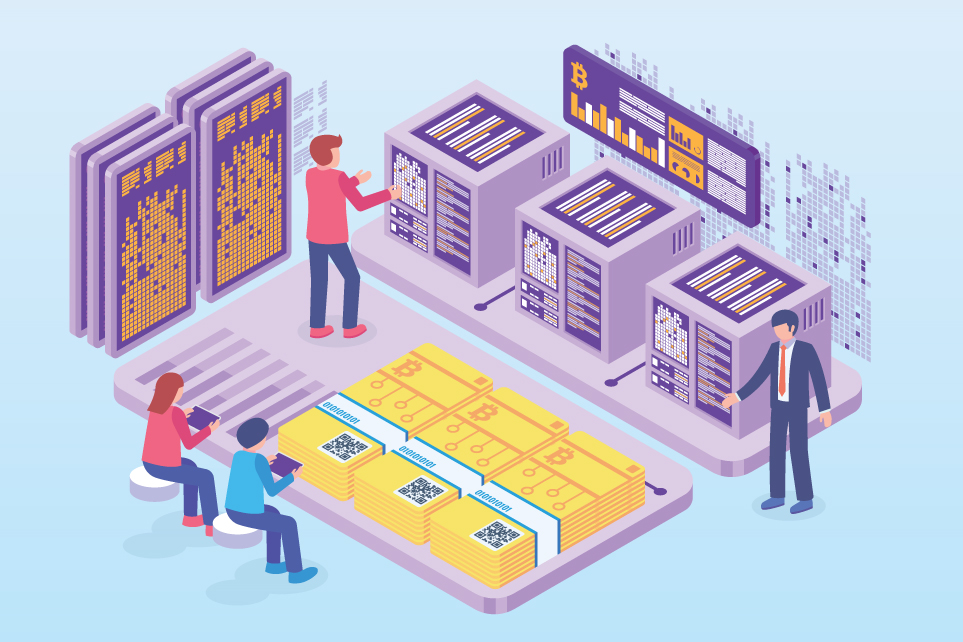The dynamic nature of the modern digital world necessitates that businesses constantly evolve to maintain a competitive edge. It is crucial that you know your product through and out, as well as the ins and outs of your market and your rivals. Information is the key to everything here. The information a firm has at its disposal is what will set it apart from the competition.
In today’s competitive world, success requires obtaining, controlling, and manipulating statistics. Moreover, your sensitive information has to be safeguarded. In particular, take a step back if you’re still utilizing outdated spreadsheets.
Use the technological advantages of the Blockchain architecture to expand your data management and data-driven business processes. For what reasons does blockchain technology facilitate smoother data sharing between businesses? Okay, let’s go see what we can find.
How Blockchain Technology Helping Data Sharing in Organizations?
Blockchain, in its simplest form, is a method of storing data that is incredibly difficult to hack, steal, or modify. In its most basic form, blockchains are just a distributed ledger of all the transactions that have ever taken place across all the nodes in the network.
Multiple transactions are recorded in each block of the blockchain, and each participant’s ledger is synced whenever a new transaction is added. Hashes, or cryptographic signatures, are used to record transactions on a blockchain.
Since each transaction has its own unique hash, data sharing frameworks can’t interfere. The use of blockchain in this way eliminates any concerns people and businesses may have about exchanging data in real-time. This is the crux of what makes blockchains so effective for data management!
Blockchain Applications for Data Management
Blockchain technology can be used in a wide variety of settings to handle data. To keep things simple, we will describe some of the ways in which blockchain technology has been used for data management.
Reliability Enhanced By Immutability
Blockchain not only provides the organization with the immutability of data but also security and protection. Proof of tampering between nodes is essential due to the immutability of data on a blockchain, which necessitates a decentralized network.
Data Traceability Improves Efficiency
Traceability is important for tracking and keeping records for organizations because it helps them keep track of their money. This means how easy it is to find historical records based on where they were kept, how they were used, or when they were made.
Blockchains are set up in a way that makes it easy to follow the order of events. The system is also easier to use and works better now that there are no third parties to get in the way of transactions or fix mistakes.
Data Security
Because of Blockchain, it is now possible to share data in a way that is both safe and confidential. If a block in a Blockchain is updated, everyone can see it immediately because of the network’s immutable nature.
Therefore, in order to change a Blockchain, hackers must modify every block in the chain, in all distributed implementations. This means that Blockchain-based information exchange will be impenetrable to malicious hackers and dishonest con artists.
Smart Contracts Enable Automated Verification
The integrity of the company’s data relies on double-checking all fields. Smart contracts are being updated and implemented using blockchain technology to solve security loopholes.
These smart contracts operate in sandboxes rather than being directly checked on the Blockchain nodes. Each node in the network may check the correctness of the data on its own, without needing to share evidence with the others.
Data Sharing
In the digital age, businesses need to share data to stay in business. Through decentralization, Blockchain makes it possible for organizations and departments to share and organize data in a safe way.
Information can be kept safe in a Blockchain database by using a certain “block.” Blockchain is now being used by businesses of all sizes to manage data in a safe, easy, and quick way, no matter how big or small the business is.
Cost-Effective Management
One of Blockchain’s defining features is the use of a decentralized peer-to-peer network to ensure data reliability. All nodes that participate in a Blockchain are responsible for managing and monitoring the chain’s data resources, in addition to accessing, managing, and authorizing data.
Since Bitcoin and Ethereum use public chains, there are no limitations on who may join or leave the networks. Considering that responsibility for data administration and sharing may be delegated between several groups, there is no one fixed price to pay. There is no human intervention required in this procedure.
Blockchain Data Sharing: Which Industries Can Get Benefited?
Blockchain technology has first been used for the purpose of facilitating the transfer of financial data across different parts of an organization. For reasons of security, blockchain-enabled data sharing is currently being used by the vast majority of businesses across all sectors. Blockchain allows for the cheap and optimum management of data to be shared across all sectors. Overall, when it comes to innovation and data sharing, blockchain technology has infinite uses.
Final Thoughts
Both blockchain technology and centralized data sharing have benefits and drawbacks. The deployment of blockchain technology in particular is still in its early stages, and there are various possible dangers and difficulties that could impair workflow. The benefits of exchanging data through Blockchain unquestionably exceed the drawbacks of the Blockchain system, notwithstanding some of its difficulties. As much as you can, benefit from technology improvements to avoid falling behind.
So, if you think you have an idea that can be incorporated with blockchain technology, then go ahead and try it out. Here at AppleTech with our team of experienced experts, can make your idea of integrating blockchain into your organization’s data sharing or development requirements into reality.

